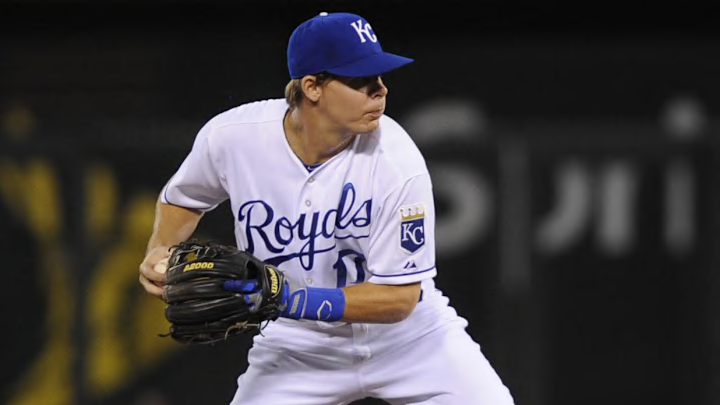Because I'm the kind of guy who, upon learning of Bobby Witt Jr. signing a long-term deal, wastes no time writing about Chris Getz, let's get started. First, backtrack to late last month, when I immediately thought of Getz when the KC Royals announced the signing of Adam Frazier. Is that fair to Frazier? On the whole, I would say no — Frazier has been an All-Star and contributed to contending teams, and his eight-season stats are far superior to Getz's when he played. So, beyond the fact that both are second basemen, why was Getz the first thing that popped into my head?
Chris Getz is a symbol of a Royals era fans prefer to forget
Getz came to the Royals after the 2009 season as part of a trade with the White Sox for Mark Teahen. He battled injuries throughout his KC tenure, but if he was healthy enough to suit up, he played. This drew fans' ire, and for good reason: Getz's best season in Kansas City was 2012, when he slashed .275/.312/.360 with no home runs and 17 RBI in 64 games, but over four seasons as a Royal, he homered once and hit .248. He didn't exactly light things up.
Meanwhile, the Royals continued to spin their wheels. The optimism surrounding Dayton Moore's hire as general manager in 2006 was waning as Kansas City fielded subpar team after subpar team. To Moore's credit, he was building something in the minors that would eventually blossom into a respectable major league team that took back-to-back trips to the World Series, but the first signs of that were not evident until 2013.
In the meantime, Getz became the whipping boy of fans and the media, a symbol of the Royals' inability to improve and/or their unwillingness to pay for better players. Only after the club signed Omar Infante to play second following the 2013 season did it become clear that times were changing, even if the upgrade ultimately turned out to be minimal.
The good times didn't last, however. For the last six seasons, the Royals have returned to irrelevancy. Going through an ownership change, a pandemic, and a controversial effort to build a new stadium, the franchise had once again retreated to its thrifty, inept former self. Fortunately, this offseason has been a breath of fresh air, especially with the signing of Witt.
Will the moves they've made this winter pan out? Who knows, but it's hard to argue against the logic of them. Signing Michael Wacha, Seth Lugo, Will Smith, and Hunter Renfroe (among others), and now extending Witt, makes the Royals better on paper.
That's where the Frazier deal comes in.
Will the Adam Frazier Era be any different from the Chris Getz Era?
Of all the moves the Royals have made this offseason, the Frazier deal is the only one that doesn't make sense. Kansas City already has younger, even cheaper, second base prospects in Michael Massey and Nick Loftin. It can even be argued they have a higher upside than Frazier. Neither is a sure bet, while Frazier is a proven commodity, even if he has trailed off from his peak the last few years. If the Royals can get "peak" Frazier, it would be a nice upgrade. But that's a big if.
By his own words, Frazier has his eyes on second base, but he'll probably play some outfield, too. General manager J.J. Picollo may have a master plan for Frazier, and when it all falls into place, may be hailed as a genius. But for now, the Frazier deal is a head-scratcher, and harkens back to the doldrums of the early 2010's, and the Era of Getz.
Don't get me wrong, this may be nitpicking at its finest. As Getz, now the general manager of the White Sox, tries to recreate his Royals "glory days" on Chicago's South Side, it's evident this is a new era in Royals baseball. Picollo and principal owner John Sherman deserve credit for what's been happening at 1 Royal Way this winter, and no matter what other tricks they may have up their sleeves or how it all works out, it's unlikely Adam Frazier is being set up to become Chris Getz 2.0.
And that's a win it in its own right.
